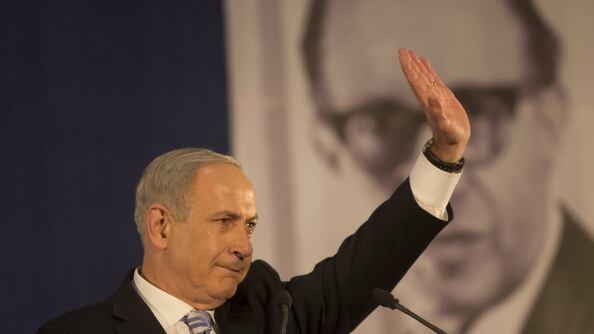Benjamin Netanyahu can be stopped. If only all his opponents could jettison their pre-conceived ideas, they could put together an alliance that would halt the Netanyahu bandwagon. If Jews and Arabs plus Ashkenazi and Sephardi Jews lined up together, Bibi could be blocked, but it takes a leap of imagination to conceive this scenario. So he almost certainly won’t be.
Many political commentators here wrote the script as soon as the coming Israeli elections were scheduled. Netanyahu, they pronounced, will be the next prime minister whatever happens. Since then they have fallen over themselves to prove the rightness of their forecast.

It’s not that they like Netanyahu—most of them don’t—but they cannot bear to be wrong. Thus every move made by the Labor Party chairman Shelly Yachimovich, Yair Lapid of Yesh Atid, and former foreign minister Tzipi Livni, who heads Hatnuah is immediately ridiculed. “I promise you,” announced a prominent television commentator, when it was announced that the three centrist leaders would meet to coordinate tactics against the right, “I promise you that this will be the only meeting of the three, and nothing will come of it!”
As it turned out, he was right. So far the only thing that emerged from their meeting was mutual recrimination, but this was not pre-ordained. It was a good idea to get together: Bibi is vulnerable. He has made several gross mistakes, but here again our local reporters and columnists are at fault. They are focusing on his row with Naftali Bennett, the new young leader of the religious-nationalist Bait Hayehudi party. While it is true that Netanyahu has proved inept at tackling this challenge from the right, it is not significant. Bennett is part of the rightwing bloc, which is not, as a whole, weakened by the fracas.
Bibi’s first major error was his tie-up with Yisrael Beitenu, the maverick party led by Avigdor Lieberman. It led to an immediate plunge in the polls, as members of both parties showed how they felt about the deal, and today, with Lieberman facing a very real threat of a seven year exile from Israeli politics, the idea looks even worse that when it was first conceived.
His second blunder is a direct result of the first: his alienation of the religious Sephardi party, Shas. This party has always been the linchpin of his power, but prodded by the (secular Russian immigrant) Lieberman party, Bibi threatened to take two key ministries away from them. Although Shas is currently paying lip-service to the “Netanyahu will be prime minister” mantra, it is no longer in Bibi’s pocket, as it was in the past.
His third blunder was to permit his young party colleagues to take the lead in trying to prevent Hanin Zuabi, a militant Israeli Arab Knesset Member, from running in the election. The insult to Israel’s Arab citizens was manifest. The Arab voters represent the joker in the pack of the Israeli elections. As I and others have noted in Open Zion, they vote heavily in municipal elections, but only around half of them cast their ballots in the national poll. They have the capacity to be the game-changer. They could vote as many as 17 Knesset Members into Israel’s parliament.
All of which brings us back to our three heroes from the center-left. The idea of Livni, Yachimovich, and Lapid collaborating to block Bibi is fundamentally sound, but they should cast their net much wider. To the left, they should include the Zionist left-wing party Meretz in their alliance, but also the Jewish-Arab Hadash party, and Taal, the Arab party led by Ahmad Tibi, one of the most active and intelligent Knesset Members. They should not, however, only look further left: Shas should also be invited into the anti-Bibi coalition.
Shas, which moved right under its former leader Eli Yishai, has recently veered leftwards (at least on social issues) under its new triumvirate that includes the (formerly dovish) Aryeh Deri. A coalition from Deri to Tibi really could muster enough votes to defeat the right. With some compromises by all its constituents, it could also hammer out a joint policy, but sadly it will almost definitely not come about.
Even if the Jewish parties could get their heads around cooperating with the Arab parties—and that is by no means certain—the centrists will be far too “pure” to cooperate with Deri, who has served time in jail after being found guilty of corruption. Never mind that he was by far the most effective Minister of the Interior that Israel ever had, our pious centrists will not be prepared to soil their hands by contact with him.
The tragic result is that, although almost two thirds of Israelis are in favor of territorial compromise and a two-state solution, they will elect an extreme rightwing government that will make this impossible. Bibi’s new government will build more settlements, will continue to undermine Palestinian moderate Mahmud Abbas (Abu-Mazen,) and will hunker down behind our separation fence, while proclaiming that the whole world is against us.
This nightmare doesn’t have to happen, but sadly it is the most likely outcome of our elections on January 22.





